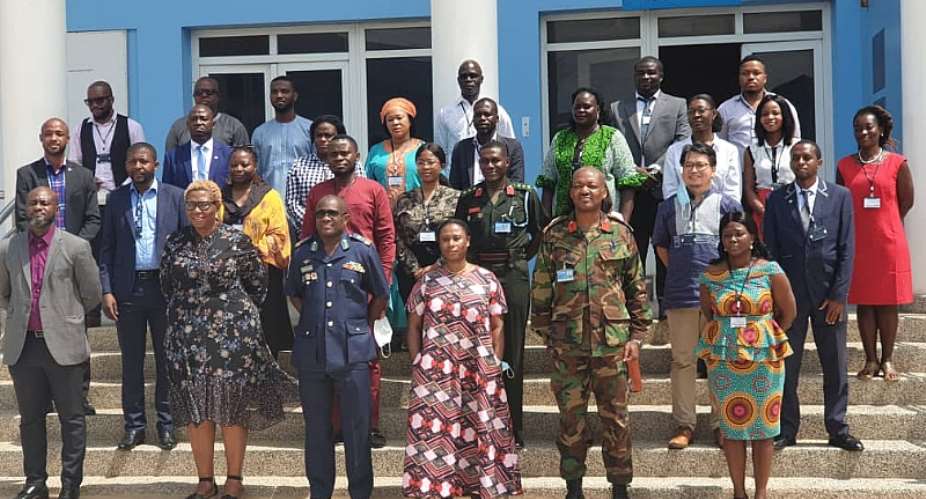Kofi Annan International Peacekeeping Training Centre (KAPITC) in partnership with the Africa Union (AU), OHCHR and the World Bank Group has commenced a three-day training course on integrating human rights into Early Warning Systems and processes.
The training which started early hours of Tuesday, March 23, 2021, is expected to end tomorrow Thursday, March 25, 2021.
The course (Human Rights in Early Warning Pilot Course) seeks to deepen participants’ understanding of the nexus between human rights, early warning, and prevention, strengthens participants’ capacity to apply the Human Rights-Based Approach in their specific areas of work and to ensure that human rights issues are fully integrated into early warning processes and to promote peer learning and exchange of the best practices on human rights, early warning.
According to the deputy commandant of KAIPTC, Air Commodore George Arko-Dadzie, the 2019-2023 Strategic Plan of the Kofi Annan International Peacekeeping Training Centre (KAIPTC) moves towards a new direction, which calls for a radical shift from a largely supply-driven business model to a need-based and demand-driven model that anchors KAIPTC’s service provision (training, research, and education) on the needs and interests of key clients.
Adding that the project focuses on the development of a training package which aimed at enhancing participants’ knowledge and capacity to integrate Human Rights-Based Approaches into early warning processes in data collection, analyses, reporting, and dissemination.
He then congratulates the participants and urged them to observe all covid 19 protocols.
In attendance were Deputy Commandant of KAIPTC – Air Commodore George Arko-Dadzie, Representative of the Office of the High Commissioner of Human Rights - Madam Adjoa Kufour Owusu, Representative of the UNDP, Sahel – Madam Nwanne Obahor, Representative of the Africa Union – Mr Ruuks Ako, the participants from across the length and breadth of Africa and the Media.
About RECs
Africa’s Regional Economic Communities (RECs) and Regional Mechanisms (RMs) constitute key building blocks for economic integration in Africa and are key actors working in collaboration with the African Union (AU), in ensuring peace and stability in their regions.
As the building blocks and implementing arms of the African Union (AU), the RECs have been central to various transformative programs on the continent, including the New Partnership for Africa’s Development (NEPAD) adopted in 2001, and the AU’s Agenda 2063 adopted by its Summit in January 2015, and its First Ten-Year Implementation Plan adopted by the 25th Summit of the AU in June 2015. Generally, the main objective of these RECs/RMs is one of co-operation in pursuit of economic development of member states.
RECs have a clear mandate to promote and protect human rights. The legal instruments of RECs, be they their constitutive acts, protocols, declarations, guidelines, policies or memoranda of understanding, place the onus on member states and institutional organs to act in accordance with the rule of law, democracy, and respect for human rights.
Therefore, RECs/RMs decision-making processes should always be guided by human rights principles laid down in such legal instruments, or that apply because they are general principles of customary law. It is believed that the proposed course will contribute significantly to helping the RECs/RMs mainstream human rights into the activities and actions with the view of changing the peace and security landscape of Africa.








 Excessive partisanship breeds madness — Prof Gyampo on NPP’s defence of cedi dep...
Excessive partisanship breeds madness — Prof Gyampo on NPP’s defence of cedi dep...
 PDS scandal: ‘The totality of Ghana’s loss is the ‘dumor’ being experienced toda...
PDS scandal: ‘The totality of Ghana’s loss is the ‘dumor’ being experienced toda...
 677,140 births and 50,992 deaths recorded in 2022 - Statistical Report
677,140 births and 50,992 deaths recorded in 2022 - Statistical Report
 Prince Harry, Meghan visit Nigeria
Prince Harry, Meghan visit Nigeria
 Ghana’s electoral commission is one that trusts thieves — Omane Boamah
Ghana’s electoral commission is one that trusts thieves — Omane Boamah
 Mahama is the embodiment of corruption; he can’t advise NPP gov’t on corruption ...
Mahama is the embodiment of corruption; he can’t advise NPP gov’t on corruption ...
 All government cares about is spending more and more money on itself — Dalex Fin...
All government cares about is spending more and more money on itself — Dalex Fin...
 COVID-19: GHS records 57% vaccination coverage
COVID-19: GHS records 57% vaccination coverage
 My government will support churches – Bawumia assures Clergy
My government will support churches – Bawumia assures Clergy
 Don't be 'conduit' to President Akufo-Addo's 'I can't hand over power to Mahama'...
Don't be 'conduit' to President Akufo-Addo's 'I can't hand over power to Mahama'...
